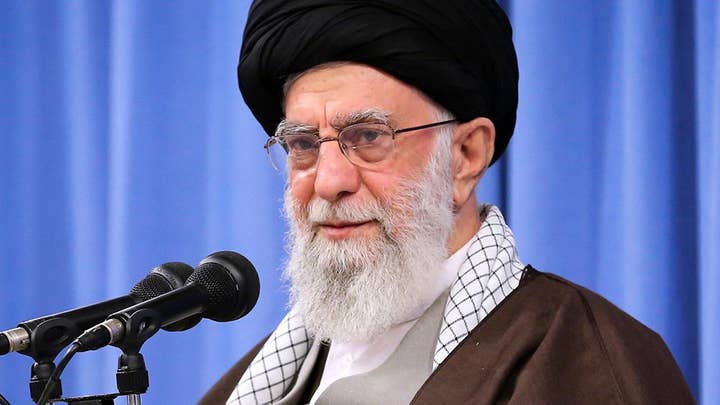Iraqi prime minister says he will resign amid deadly protests
Anti-government protests in Iraq called out corruption, poor services and a lack of jobs; reaction and analysis from retired Lt. Col. Dakota Wood, senior research fellow for defense programs at the Heritage Foundation.
Iraqi Prime Minister Adel Abdul-Mahdi announced Friday he would resign after more than 40 anti-government protesters were killed by security forces a day earlier, as deadly confrontations between demonstrators and authorities continue across Baghdad and southern Iraq.
The move comes 13 months after Abdul-Mahdi, 77, took office, which triggered celebrations by anti-government protesters who've called for reforms to root out corruption, fix the country's high employment and improve public services.
"I will submit to parliament an official memorandum resigning from the current prime ministry so that the parliament can review its choices,” he said in a statement.
IRAN PROTESTERS BURN IRANIAN CONSULATE AS DEADLY UNREST CONTINUES

In this May 15, 2019 file photo, Iraqi Prime Minister Adel Abdul-Mahdi speaks to the media during a joint news conference with Turkish President Recep Tayyip Erdogan, in Ankara, Turkey. Abdul-Mahdi said Friday, he would submit his resignation to parliament, a day after more than 40 people were killed by security forces and following calls by Iraq's top Shiite cleric for lawmakers to withdraw support. (AP Photo/Burhan Ozbilici, File)
He was appointed Iraq's fifth prime minister following the 2003 U.S.-led invasion that toppled Saddam Hussein.
Iraq's top Shiite cleric, the Grand Ayatollah Ali al-Sistani, also called for lawmakers to withdraw their support for the prime minister.
Abdul-Mahdi said he "listened with great concern" to al-Sistani and made his decision in response to his call and in order to "facilitate and hasten its fulfillment as soon as possible."
On the street near Baghdad's packed Tahrir Square, people celebrated with caution.
"The political system will replace him with someone exactly the same,” said Taif, a 39-year-old protester. “Until this sick system is destroyed, we won’t leave.”
MARINE KILLED IN IRAQ OVER SUMMER DIED FROM ENEMY FIRE, OFFICIALS SAY

In this Wednesday, Oct. 30, 2019 file photo, anti-government protesters hold an effigy of Iraqi Prime Minister Adel Abdel-Mahdi during ongoing protests in Baghdad. Celebrations erupted in Iraq's Tahrir Square on Friday where anti-government protesters have been camped out for nearly two months following an announcement by Iraqi Prime Minister Adel Abdul-Mahdi, would be resigning. (AP Photo/Khalid Mohammed, File)
Another named Mortada, 21, said protesters want electoral reforms and "real change."
“It’s not one man, it’s the whole system that needs to resign," he said.
Both Taif and Mortada declined to give them full names for fear of retaliation.
Nearly 400 people have been killed since protests broke out nearly two months ago amid widespread dissatisfaction with the government. If accepted when put to a vote, Abdul-Mahdi would be the second Arab leader to be forced out by mass protests in recent months.
Saad Hariri resigned as Lebanon's prime minister on Oct. 29, which has resulted in gridlock and uncertainly in that country's political system.

In this Sunday, Nov. 3, 2019 file photo, protesters hit a poster showing Iraqi Prime Minister Adel Abdel-Mahdi with shoes during ongoing anti-government protests in Baghdad. (AP Photo/Khalid Mohammed, File)
Iraqi officials criticized Abdul-Mahdi’s decision to submit his resignation via the more time-consuming route of parliament instead of directly to the president, who has the power to accept it immediately.
“There’s going to be a lot of horse-trading going on, or it could be paralysis, and nothing changes," one Iraqi official said.
IRAQ SHAKEN BY ONE OF ITS 'WORST' DAYS OF PROTESTS; AT LEAST 13 KILLED
The resignation creates new uncertainties, as the Iraqi constitution doesn't provide a framework in the event of a prime minister steps down.
“To my understanding there is no clause (in the constitution) that says how long he can remain in the post once his resignation is accepted,” said Sajad Jiyad, the managing director of Bayan Center, an Iraq-based think tank.
The federal supreme court could step in if the caretaker government and parliament are unable to come to an agreement, he said.
CLICK HERE TO GET THE FOX NEWS APP
Abdul-Mahdi, a former oil and finance minister and ex-vice president, was seen as a political independent when he took office in October 2018. His administration was often caught in the middle of tensions between the U.S. and Iran.
Many feared some of his staffers had close ties to Tehran, a key concern of Washington. In addition to frustration with their political leaders, anti-government protesters also rejected Iranian influence in Iraqi affairs.
Protesters have torched two Iranian consulates since demonstrations began in October.
The Associated Press contributed to this report.









































